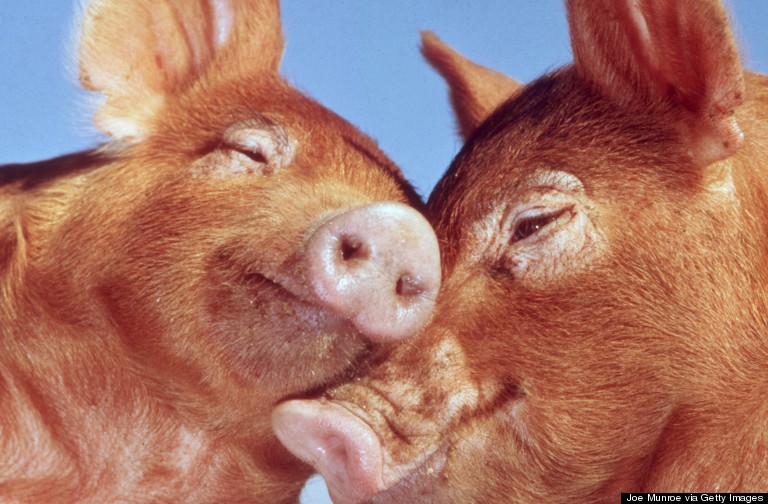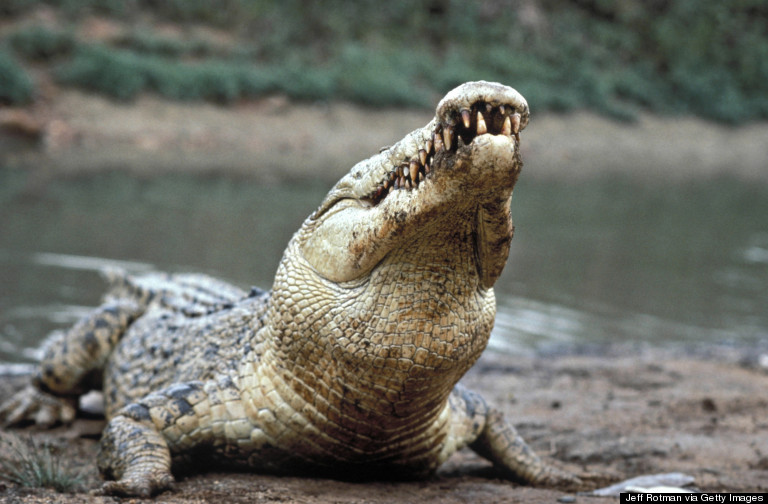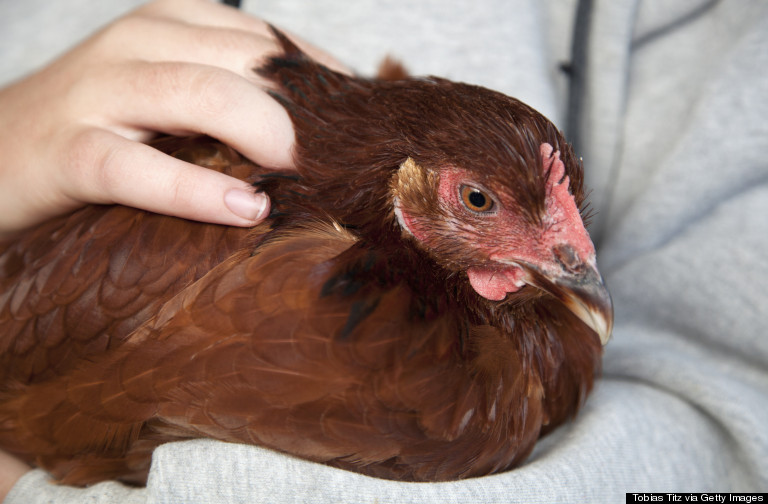
Do dogs feel pleasure? How about crocodiles?
Jonathan Balcombe says yes, they do. And not just dogs and crocodiles, but also fish, monkeys, pigs and chickens.
"Why wouldn’t they?" he says. "Pleasure is nature’s way of saying 'Good behavior!' It encourages us to do it again. Little wonder, then, that food, play, sex and friendships feel so good. Fishes line up for a spa service from cleaner-fishes, crocodiles love to bask in the sun, as do chickens, and if you haven’t seen a pig eat a pumpkin then it’s time you turned your lights on."
Balcombe, who lives just outside D.C., is an animal behaviorist and the department chair for animal studies at Humane Society University, the Humane Society of the United States' mostly-online higher education arm. He's an advocate for animal welfare and has written a handful of books about what goes on inside animals' heads, some of which feature incredibly moving photos of different creatures who look to be having a world of fun, like these pigs here:

Two loving piglets nuzzle and kiss against a blue background, Iowa. (Photo by Joe Munroe/Hulton Archive/Getty Images)
HuffPost caught up with Balcome not long after HSU's recent conference on the science of animal thinking and emotions, to find out about more about what we now know, and don't, about our furry friends and their scaly counterparts -- and what he sees as the "enormous" implications of these findings.
Do animals feel pleasure? How do we know one way or another?
Animals certainly do feel pleasure! We can tell they do by observing what happens on the outside -- how they behave. And by observing what happens on the inside -- how their physiological states change. Skeptics sometimes claim that we can’t “know” if an animal feels pleasure because their feelings are private, but the same can be said of our fellow humans yet we don’t conclude that we therefore might not be able to feel pleasure.
What are the most recent discoveries about animal pleasure? Are there animals who people used to think didn't feel pleasure, but who we now think do?
Here’s a scientific one and an anecdotal one. A research team in Portugal found that surgeonfishes who are feeling stressed spend more time up against a mechanical wand that strokes their skin than do fishes who have not been stressed. This was not presented as pleasure, per se, but my interpretation is that the soothing, pleasure of being touched is what helps to relieve stress. Anecdotally, one can watch monkeys “cliff-diving” off a large rock on the coast of Thailand here.
This is just one of many examples of monkeys leaping into water, and I think it conveys the same sort of thrill we get when we dive from a perch, speed down a slope, etc.
Are there any animals who don't feel pleasure?
This is really a question of where do we draw the line on animal sentience -- the capacity to experience feelings. As science reveals ever greater feats of cognition and emotion in an expanding range of animals, we have had to discard old beliefs that denied feelings to most animals. Currently, the evidence is strongly supportive that all vertebrate animals have feelings that should include pleasure. And evidence is building that at least some invertebrates, including cephalopod mollusks (octopus, squid, etc.) and crustaceans (crabs, lobsters, etc.) can experience pain. If an animal can feel pain, then I believe it is equipped also to feel pleasure.

Photo credit: PJLEWIS/FLICKR
Have you ever been surprised by a discovery about animals?
I am continually surprised by new discoveries of animals. I was delighted to learn, for instance, that lemurs rub large millipedes on their faces to fumigate themselves with toxic repellents that seem to send them into a drug high. I was amazed, for instance, to learn that wasps recognize each other’s faces, that parrotlets name their chicks, and that dogs glance at the left side of our faces first, to glean more information about our emotional states.
How did you get involved with this field?
I was born. I have adored animals from my earliest memory. I never got involved in it. It grabbed me and thrust me in its midst.

Photo credit: Dennis Drenner via Getty Images
What are the implications - moral, legal, societal - of animal pleasure?
The implications are enormous. An animal who can feel pleasure has a quality of life, a life worth living. It follows logically, it seems to me, that such a being ought not be defined as the property of humans, which is how all animals are defined in the current legal framework. I don’t believe we have a moral obligation to actively provide animals with pleasure (except when we keep them captive), but we err when we deliberately deprive them of opportunities to pursue the rewards that a natural existence would normally provide them. It also seems to me that the capacity for pleasure renders death harmful, because death deprives the victim of the opportunity for future pleasures.
What are the questions you'd still like to find answers to, regarding animals and pleasure? How about regarding animals and anything else?
I would like to see some science applied to the question of esthetic pleasure in animals. For instance, what is a peahen feeling when she beholds a displaying peacock? How does a hummingbird feel when he finds a cluster of trumpet-flowers in full bloom?
I’m also intrigued by the potential for animals to experience emotions we often assume are felt only by us. There is good reason to believe that animals can feel thrilled. And tickled rats’ brains show similar loci of activity as ours do when we’re feeling mirthful. I would like to see more attention paid to the experiences of reptiles and amphibians. For too long they’ve been dismissed as instinct-driven and unfeeling.
As usual, these are premature biases. For instance, the recent work of [zoologist] Vladimir Dinets and others have revealed heretofore unknown aspects of the lives of crocodilians, including tool-use, planning, paternal care, tree-climbing, courtship dances, and various forms of coordinated -- or cooperative? -- hunting.

Photo credit: Jeff Rotman via Getty Images
You obviously work as an advocate for animal welfare. You advocate for veganism. What would you say to people who aren't moved by animals' capacity for pleasure and pain? Or to people who say that it's natural for people to eat meat?
I’m not moved by tax forms, but I have a responsibility to pay taxes. We can’t expect everyone to love animals, but moral issues transcend personal preferences. Someone who doesn’t like children nevertheless can see that children deserve love and legal protection. Similarly, one doesn’t need to love sharks to take offense at their having their fins cut off then tossed overboard to die so that someone can buy expensive soup at a Beijing restaurant.
I wouldn’t deny that it’s natural for people to eat meat. We evolved as omnivores. But I don’t see anything natural in confining animals in tiny cages or crates, abducting babies from their mothers so we can take all the mother’s milk, cutting off their body parts, feeding them antibiotics, etc. In the end, we have a choice about what we eat, and what we fund. And that includes the option support food choices that don’t cause animals to suffer or die.
Do you think it's possible to have humane meats or humane eggs?
For some that depends on how you define “humane,” and it certainly depends on how you define “meat.” There is a growing selection of plant-based meats on the market now that are qualitatively very similar to animal flesh. I actually recently ate a dish with real chicken in it, thinking I was eating Beyond Meat’s chicken (which I’ve eaten many times). I hadn’t eaten chickens in 30 years but was totally fooled by the similarity.
The development of in vitro meat introduces an intriguing new twist on the dynamics of meat consumption. I do think it is possible to eat humane eggs. For example, I don’t regard the eggs laid by happy chickens at animal sanctuaries as having any ethical baggage, though most of these places discourage egg consumption because they don’t wish to perpetuate any form of carnism.
What do you wish more people understood about animals?
Many things! Here’s one. I wish people wouldn’t dismiss fishes as primitive. Fishes have been evolving longer than anybody else, and they are every bit as sophisticated and wondrous as their land-born cousins.
What practices do humans engage in now that you think 10 years from now will be considered obviously cruel? 100 years from now?
We are already seeing widespread public repudiation of factory farming, even as paradoxically it is still expanding on a global scale. I think it will be in full decline in 10 years. Others on my list include: trophy hunting, foie gras and veal farming, shark finning, seal hunts and other animal pogroms. 100 years: vivisection, animal fighting, rodeos, fishing contests, fishing with barbed hooks, dog breed amputations (tails, ears, etc.), classroom animal dissections, fur-wearing.

Photo credit: Tobias Titz via Getty Images
A lot of people aren't prepared to go vegan or entirely eliminate the use of animal products from their lives. What can people who are like that, but still care about animal welfare, do to improve animals' lives? Are there smaller steps that people can take?
There are limitless ways to help animals. Writing letters to Congress members and local papers, voting with one’s wallet at the drugstore, department store and supermarket, and supporting local and national animal protection organizations are all ways that individuals can make a positive difference for animals.

